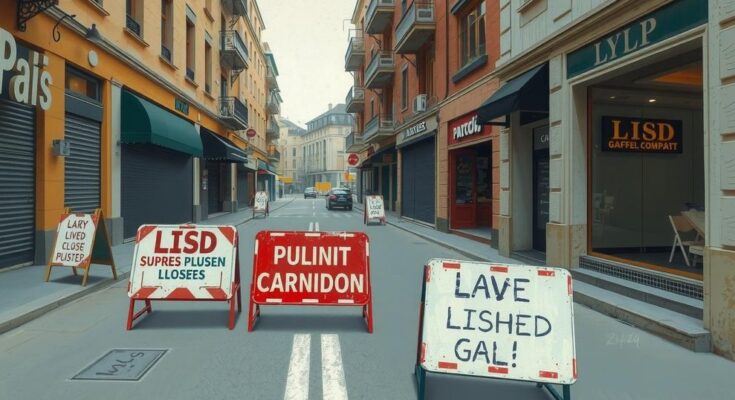Argentina is experiencing severe economic turmoil characterized by rampant inflation and significant public protests. President Javier Milei’s administration has enacted austerity measures and aimed for dollarization, but these reforms face backlash from citizens amid cuts to public spending. The General Confederation of Labor has called for strikes, highlighting rising unemployment and dissatisfaction with the government’s economic strategy. Current inflation rates remain alarmingly high, raising concerns about the nation’s financial stability.
Argentina is currently grappling with significant economic turmoil, characterized by rampant inflation and widespread dissatisfaction manifested in union protests. The government released its 2024 economic figures on March 19, 2025, revealing an inflation rate of 118%, substantially lower than the 211% recorded the previous year, thanks to stringent fiscal measures implemented by President Javier Milei’s administration.
Under President Milei’s leadership, the administration has pursued a radical agenda focusing on austerity measures and the repeal of the fiscal deficit. His campaign emphasized the dollarization of the economy and dramatic cuts to government spending aimed at tempering inflation. However, the execution of these promises has faced considerable opposition. Milei initially aimed to appoint Emilio Ocampo as head of the Argentine central bank to oversee dollarization, yet political reality prompted a change of strategy, leading to the appointment of Santiago Bausili instead.
Market analysts note that, “The initial dream of reinstating the currency anchor has been forsaken.” In response to the push for fiscal tightening, Javier Milei’s cabinet has announced expenditure cuts, equating to an alarming 6% of GDP. This austerity in public works, salaries, and subsidies has provoked widespread civil unrest, prompting the General Confederation of Labor (CGT) to organize a general strike scheduled for April 10, 2025, marking their third such action since Milei took office in December 2023.
CGT secretary general, Hector Daer, noted, “Rising unemployment will be a focus of the strike,” emphasizing that citizens cannot passively witness increasing layoffs. The public sentiment remains largely negative as various economic sectors report adverse impacts from the limitations on salary negotiations and significant declines in purchasing power for both active and retired workers. Furthermore, Daer stated, “This strike will not be lifted,” highlighting the defiant mood against the prevailing austerity measures.
While inflation continues to pose serious challenges, the Milei government is carefully strategizing currency devaluation. A recent adjustment of the official exchange rate resulted in a 54% increase, although analysts maintain skepticism regarding the government’s financial objectives for the upcoming year, especially given the direct link between inflation and currency value.
Current economic conditions illustrate that even basic commodities are costly; for example, a Big Mac in Argentina costs nearly 60% more than in the United States, underscoring the pressing inflationary pressures and a weakened peso. Whereas there was initial optimism surrounding the unification of exchange rates, the government has instead resorted to minimal devaluation actions, with inflation hovering around 2% per month and forecasts predicting an annual inflation rate of 23%.
In a broader historical context, the CGT plans to participate in the upcoming march to honor victims of Argentina’s military dictatorship on March 24, emphasizing that the consequences of past decisions resonate with current discontent. As unrest proliferates, President Milei finds himself negotiating between adhering to his radical economic agenda and catering to a populace increasingly fatigued by austerity measures.
Presidential spokesman Manuel Adorni has disparaged the union’s initiatives, suggesting, “There is nothing that warrants a strike,” while negotiations with the International Monetary Fund regarding a new loan program continue. The ongoing situation in Argentina reflects a deeper narrative of economic hardship and social unrest, juxtaposing the administration’s stringent fiscal objectives against the rising chorus of dissent, raising the critical question: Can radical reforms stabilize the economy, or will the push for austerity exacerbate the nation’s difficulties?
In conclusion, Argentina is navigating a precarious economic landscape marked by soaring inflation and increased public discontent, culminating in protests and strikes led by the General Confederation of Labor. President Javier Milei’s ambitious plans for dollarization and austerity have faced public resistance amid substantial cuts to government spending. The nation stands at a crossroads, grappling with the effectiveness of these radical reforms while the eyes of the world focus on the unfolding economic drama in Argentina.
Original Source: evrimagaci.org




